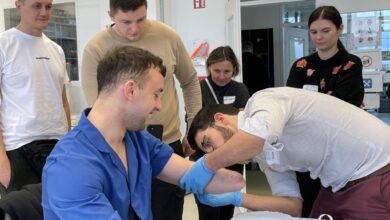By Jennifer Bihm
Kaiser Permanente officials are aiming to become a part of the homeless solution in Southern California with a $4.3 million grant to Los Angeles and San Diego for more affordable and secure homes. Those counties, officials said, have the highest rates of homeless with the least affordable housing. The grant will help to create and preserve 75 affordable and/or permanent supportive housing units in the two areas.
“Stable, affordable housing is essential to a person’s health,” said John Yamamoto, vice president of Community Health and Government Relations at Kaiser Permanente Southern California.
“Yet, many of the communities we serve are grappling with high rates of housing insecurity and homelessness. These efforts are designed to help change that.”
“Health problems among homeless persons result from various factors, such as barriers to care, lack of access to adequate food and protection, and limited resources and social services,” according to medical experts at the Centers for Disease Control in Georgia.
“As each of these factors have legal underpinnings, legal and policy interventions have often been used to attempt to address homelessness, although not always from a public health perspective.”
But Kaiser officials said public health is the main perspective from which homelessness should be viewed. Lori Chatman, president of Enterprise Community Loan Fund, said the private capital investment is to support well-designed homes that are affordable and connected to health care, good jobs, schools and transit.
“As a social impact investor, Kaiser Permanente is investing to create better health outcomes for residents while earning a financial return,” she explained. “We hope that Kaiser Permanente’s investment will inspire even more socially minded investors to recognize the connection between positive health outcomes and a stable home.”
In Los Angeles, $1.1 million will be invested in a Los Angeles Family Housing development in the North Hills area of the San Fernando Valley, said Kaiser officials.
The Angel Apartments project will transform 22,260 square feet of underutilized commercial space into 53 units of permanent supportive housing for formerly homeless residents, as well as chronically homeless veterans. The development will feature four residential floors and on-site support services that include intervention, education and employment assistance, substance abuse and health treatment, after-school academic support and community activities.
“We’re just getting started,” Yamamoto said. “The Los Angeles and San Diego projects are the first two investments aimed at reducing homelessness and supporting housing for health. We’re actively searching for future affordable housing projects and partnerships throughout Southern California.”
The $4.3 million dollar grant is part of the the recently created $100 million RxHome Fund. This fund is comprised of a $50 million loan from Kaiser Permanente to Enterprise Community Loan Fund, plus an additional $50 million in capital from ECLF.
“The goal of the RxHome Fund is to create and to preserve 3,250 healthy and affordable homes over the next decade in Kaiser Permanente’s service areas nationwide,” officials said.
A formerly homeless veteran called Michael, said he and others are grateful for Kaiser’s efforts to help alleviate homelessness. Housing, he said, is essential for stability and a better quality of life.
“Affordable and supportive housing is important for veterans,” he explained. “Veterans are likely to become chronically homeless because in military service, we learn to live in a harsh environment, have a higher tolerance for difficult situations and have a certain degree of pride. Coming back from service, it can often be difficult to adjust back into society, so having the support and resources to help us work through our experiences is extremely important. I appreciate the dedicated people who make affordable housing for veterans possible, because it shows that the community and the city do care about our needs and will do something to end homelessness for veterans.”
This article originally appeared in The Los Angeles Sentinel.





